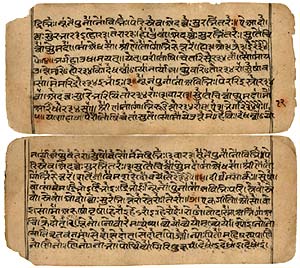Veda- The Oldest Scriptures of Hinduism
What is Veda
The Vedas (Sanskrit- वेदः vedaḥ) which means “knowledge, wisdom”, are main eastern religious scriptures originating within the territory of ancient Nepal and India. They are the oldest scriptures of Hinduism. Vedic texts forge the most ancient Sanskrit literature. Vedas contain the depth and fundamental knowledge regarding to the prime cause of, function of, and individual reaction to supreme entity.
Vedas are also known as śruti (“what is heard”), which are different from smṛti (“what is remembered”). People regard the Vedas to be apauruṣeya, ie “not of a human, superhuman”. Vedas are believed to be “authorless, impersonal”, manifestation of sacred syllable, sound of God and divine texts experienced by primitive yogis during accomplished meditation.
The term véda is derivated from the root vid which means “to know”. It has some similar meanings with the Proto-Indo-European root u̯eid-, meaning “know” or “see”. The homonymic singular perfect tense, 1st and 3rd person véda, associated to Greek (ϝ)οἶδα (w)oida “I know”. In south India, Vedas are also called Maṛai or Vaymoli. Marai literally means “hidden, a secret, mystery”. According to the hymn of Rig Veda at 10.93.11, “veda” means “obtaining or getting wealth, property”. Similarly the term also means “a bunch of grass together” for ceremony or as in a swab.
Types of Veda, Origin and History
There are four Vedas with special knowledge for the mankind:
I. The Rigveda (Sanskrit- ऋग्वेद) : It is the oldest known Veda with a large collection of hymns in praise of the gods, which are chanted in various rituals. It has Verses of 10,552 mantras and chapters 10 mandalas. It was originated in the period c. 1500–1200 BCE, while rest of the Vedas during 1200–900 BCE.
II. Samaveda (Sanskrit- सामवेद): It is the knowledge about melodies, songs, melodies and music. It is a vedic liturgical scripture with 1,549 verses.
III. The Yajurveda (Sanskrit- यजुर्वेदः) : It is about recitations, methodology of ritual worship, mantras formulas, chants outright embrace in worship services.
IV. The Atharvaveda ( Sankrit- अथर्ववेदः): The term “Atharva” means “knowledge”. It is the youngest among the vedas. It is the of atharvāṇas knowlwdge where the rules for everyday life is are provided. It has 20 chapters in kāṇḍas, 5,977 mantras. It was originated in the period c. 1000–900 BCE.
Each Veda has four subsectors
a) the Samhitas (literally- put together, union, join): They are collection of mantras, hymns litanies, prayers, and benediction.
b) the Aranyakas: They are composed in Sanskrit 700 BC, related with rituals, ceremonies, sacrifices and symbolic-sacrifices. The Aranyakas talks on mystical and philosophical aspects and explications of esoteric rites.
c) the Brahmanas: They are about ceremonies, rituals, and sacrifices,
d) the Upanishads: The discuss about meditation, philosophy and spirituality.
Some learned consider the fifth subsector – the Upasanas (worship).
Importance of Vedic Texts
Since the Vedas are the Source of knowledge both scientific and spiritual, also mundane and heavenly, they are the eye and light for life.
- Vedas teach the way of life, rules, and regulations in life- like what is to be done and what should be avoided.
- They teach methodologies, process, and ways about various mantras, chanting, devotion, yoga, spiritual practices, rituals, rites, traditions. You will find about heaven and hell, attainment of heaven with good deeds, and hell with bad deeds.
- One will understand what is to be done and what is to be avoided; what is right and what is wrong, etc.
- Vedas are the source of all the scientific development like automobiles, aeronautics, engineering, engines, building, constructions, etc.
- Vedas are the source of knowledge about art, music, songs, tune, melody, dance, etc.
- The root of the medical science, surgery, Ayurvedic and herbal medicine, treatment, healthy habits, etc. are the Vedas.
- Vedas are the science to predict the future, perfect life in the present, knowledge through the past.
- They have taught about marriage, sex, pregnancy, delivery, male and female role, characteristic of baby etc.
- The knowledge regarding astrology, astronomy, Geology, Biology, Zoology, etc. are found in Vedas.
- Vedas teaches about the law of Karma, the law of nature, and life.
Importance of Vedic mantra
- When Vedic mantras are chanted with full concentration and with correct pronunciation, it changes own spiritual energy and universal energy.
- Vedic mantras are part of every occasion and the ceremony of the Hindus such as- marriages, at the beginning of important work, rituals of newborn, rituals of Vratabanda, rituals at death, etc. for making them successful.
- Mantra creates a marvelous vibration that brings a unique change in the environment in various situations. It expurgates negativity and welcomes positivity.
- Mantras have the capacity to bring divine power, siddhis. It connects with the supreme power.
- It syncs the practitioner with the universal energy through which power to enfold and penetrate each and every living and the non-living things in the universe will arise.
- Mantra chanting awakens complete health. It releases stress, tension, sufferings, disorders, etc. you healthy. Mantras keep you peaceful add calm.
- Vedic mantras are helpful to attain the goals.
- Mantras create healing energies for the self and others.
- Vedic mantras are also practiced for material desires like wealth, prosperity, social power, etc. The mantra chanting with devotion brings protection, security, success, love, enjoyment, pleasure and happiness.
Study and teaching of Vedas
The teaching and study of Vedas, and their transmission has been assumed since the 2nd millennium BCE with the help of elaborate mnemonic techniques. There was “Guru-sishya parampara” ie “the tradition of teacher- disciple” where disciple used to stay in with Guru (teacher) with full of devotion and service for Guru.
There are unlimited knowledge and information in Vedas. The most ancient part of the Vedas are mantras which are recited in the present age for phonology and semantics. Their phonology are treated to be “primordial rhythms of creation”, and pronounced through the mouth of God. Vedas recitation regenerates the cosmos which inspirits and cherish the forms of creation at their foundation.”
The several Eastern philosophies and Hindu delineations have taken distinguishing stands on the Vedas; schools of Vedic philosophy that enter upon the primordial authorization of the Vedas are deal out as “orthodox” (āstika). While some śramaṇa traditions, like Ajivika, Buddhism, Carvaka, Jainism, Lokayata, which consider the Vedas in various ways.

